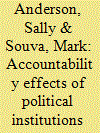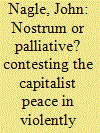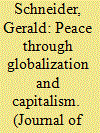|
|
|
Sort Order |
|
|
|
Items / Page
|
|
|
|
|
|
|
| Srl | Item |
| 1 |
ID:
100944


|
|
|
|
|
| Publication |
2010.
|
| Summary/Abstract |
Selectorate theory posits that leader accountability increases with the size of the winning coalition. Recent research contends that capitalism also increases leader accountability because leaders are more dependent on the public for revenue in more capitalist economies. The authors argue that extant tests of accountability arguments of interstate conflict initiation and targeting are flawed. Accountability theories of foreign policy expect leaders to selectively initiate disputes based on their probability of winning. Accountability arguments, then, expect a conditional relationship between the accountability mechanism and the balance of power. For example, if capitalism produces peace through accountability, then more capitalist states should be less likely to initiate militarized disputes as their power advantage decreases. The authors find that this is not the case. At the same time, the authors find robust support for selectorate theory's contention that larger winning coalitions are more selective about using military force. Political institutions induce accountability; capitalism does not.
|
|
|
|
|
|
|
|
|
|
|
|
|
|
|
|
| 2 |
ID:
146924


|
|
|
|
|
| Summary/Abstract |
The capitalist peace thesis argues transnational economic ties have a pacifying effect on interstate relations. An extension of this literature reports that economic ties can prompt belligerents in civil conflicts to peacefully resolve their disputes and can attract third-party intervention from states with strong economic ties. This pacifying effect of economic ties, we argue, is applicable in the context of coups d’état: as a state becomes more economically interdependent with the rest of the world, the opportunity costs of domestic political disturbances are raised for both the targeted state and its financial partners. These costs – potential economic losses and a damaged economic reputation – influence belligerents in the state to use constitutional means to resolve their disputes while providing stronger incentives to foreign economic partners to influence the calculus of these belligerents as they consider the coup attempt. We test this argument quantitatively by investigating the influence of a dozen indicators of economic openness on coups in a global sample of states from 1952 to 2007. Our findings demonstrate the applicability of the capitalist peace thesis to coups d’état, manifestations of political uncertainty that are less likely to be accompanied by substantial loss of life or destruction of infrastructure.
|
|
|
|
|
|
|
|
|
|
|
|
|
|
|
|
| 3 |
ID:
085304


|
|
|
|
|
| Publication |
2008.
|
| Summary/Abstract |
Fifteen years ago, Charles Kegley spoke of a neoidealist moment in international relations. This article examines how the number of armed conflicts has declined in the decade and a half since Kegley's presidential address and shows that the severity of war has been declining over a period of over six decades. The number of countries participating in war has increased, but this is in large measure due to coalition-building in several recent wars. Overall, there is a clear decline of war. It seems plausible to attribute this to an increase in the three factors identified by liberal peace theorists: democracy, trade, and international organization. Four alternative interpretations are examined: the temporary peace, the hegemonic peace, the unsustainable peace, and the capitalist peace. The article concludes that the latter, while running close to the liberal peace interpretation, also presents the greatest challenge to it. Indeed, we seem to be living in a commercial liberal period rather than a world of neoidealism.
|
|
|
|
|
|
|
|
|
|
|
|
|
|
|
|
| 4 |
ID:
099850


|
|
|
|
|
| Publication |
2010.
|
| Summary/Abstract |
In recent years the assumption that democracy automatically generates peace has been critiqued. It has instead been suggested that the promotion of economic liberalism provides a much stronger basis for peace. In this paper, we examine and contest the normative claims of the 'capitalist peace'. While there is a close association between extreme poverty and the onset of civil war, it is unclear whether economic liberalism will ameliorate conflict. A major reason for this ambiguity is because the emphasis of the 'capitalist peace' literature has largely been on interstate relations rather than intrastate ethnonational conflict. A closer look reveals that neoliberal policies in divided societies can also, in some contexts, exacerbate conflict in violently divided societies.
|
|
|
|
|
|
|
|
|
|
|
|
|
|
|
|
| 5 |
ID:
128865


|
|
|
|
|
| Publication |
2014.
|
| Summary/Abstract |
The security externalities of globalization and capitalism continue to play an influential role in peace research. Typical contributions to these interrelated areas of scientific inquiry address the hope that the external openness (commercial liberalism) and the internal freedom of an economy (capitalist peace) pacify interstate as well as intrastate relations. I claim, despite the empirical support both theses have received, that they face considerable analytical hurdles. Commercial liberalism has, on a theoretical level, not yet moved much beyond the opportunity cost arguments that enlightenment philosophers first advanced more than 200 years ago. The capitalist peace research program similarly does not offer clear micro-level mechanisms explaining why the interactions between economic agents and political decisionmakers should be more peaceful in capitalist than in state-dominated economies. Drawing on the political economy literature, I argue that economic liberalism should distinguish between level- and change-effects of both globalization and capitalism and that thinking in analogies between domestic and interstate peace has prevented the field from making analytical headway. Both literatures will only profit from the advent of 'big data' in the case that the field addresses the theoretical challenges upfront.
|
|
|
|
|
|
|
|
|
|
|
|
|
|
|
|
|
|
|
|
|